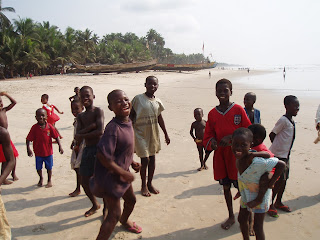> Today, I came across two interesting Africa Reports that I wante to share with you.
Today, I came across two interesting Africa Reports that I wante to share with you.
AR#1. The African Commission’s Final Report.
The African Commission , set up by the Danish government last year, is a high level group wanting to bring light to Africa’s opportunities and add new strategies to the development cooperation. I wonder if Dembisa Moyo that I wrote about last week thinks they succeeded.
Anyways, the group of really distinguished Africans and others includes Nigerias former finance minister Ngozi Okonjo-Iweala who I wrote about here and the Commission presents its recipy for development as follows: (this is the quick version, the 90-page report can be downloaded in pdf here).
1. The creation of an African Guarantee Fund in partnership with the African Development Bank aimed mobilizing loans for three billion USD and reducing the cost of access to finance for small and medium-sized enterprises, SME’s. Africa’s SME’s provide 80 percent of output and jobs in Africa;
2. Ensuring access to energy at the local level by launching a new initiative in partnership with the EU and the African Development Bank. More than three-quarters of Africans lack access to electricity – a major constraint to economic development, doing business and standards of living;
3. Improving the business climate and Africa’s competitive edge by making sure that the World Economic Forum’s Global Competitiveness Report covers all African countries. More than that, the Commission will work with a range of Africa-based entities to ensure that the findings of this benchmarking process is followed-up by the development of detailed policy responses and concrete reforms;
4. Unleashing the power of African entrepreneurship, both in start-up and existing enterprises, by providing advisory services and access to finance in order to allow young people to translate their good ideas into practical plans. The initiative will be implemented in partnership with the ILO and Youth Employment Network (a partnership between the UN, ILO and World Bank). It is expected that this initiative alone will create 40,000 new jobs and 20,000 new businesses;
5. Supporting higher education and research. Specifically, the initiative will increase the quantity and quality of artisans through apprenticeships, especially in the rural areas. Also, it will link tertiary research and business practices especially to expanding agricultural output.
I like how the Commission acknowledges the lack of electricity and how that is a basic problem in Africa (see what I wrote on it here). Also education is key, of course for development and currently the future for the African academy looks rather bleak. Just as in the north, links with research and businesses need to be improved. So, far I agree.
However, I am more sceptical towards yet another fund, the African Guarantee fund – I think many times it is information and reporting that is scarce – not a complete lack of money. And then sometimes I think the people in those high level meetings overstate the influence of their instruments. I mean, can the “World Economic Forum’s Global Competitiveness Report” really improve the business climate in Africa?
What do you think?
 AR#2 Magazine The Africa Report.
AR#2 Magazine The Africa Report.
I picked up a copy of this mag I haven’t seen before. I am a huge fan of news magazines like Focus on Africa and The Economist and today I found one that can compete.
In this mag, I liked the topics and the rich ways of describing current issues in Africa. I have studied it now for about 45 minutes, but is nowhere near done. I like that type of publication density.
The current issue of The Africa Report gave a very illuminating report of Mills’ first 100 days in power and came with an interesting economic report-booklet of Cote D’Ivoire.
I guess that makes it three Africa reports today…
In the top pic Africa’s future on the beach in Kromantse, Central Region, Ghana.
 Did you know that private higher education in on the rise in Ghana and Africa?
Did you know that private higher education in on the rise in Ghana and Africa?


